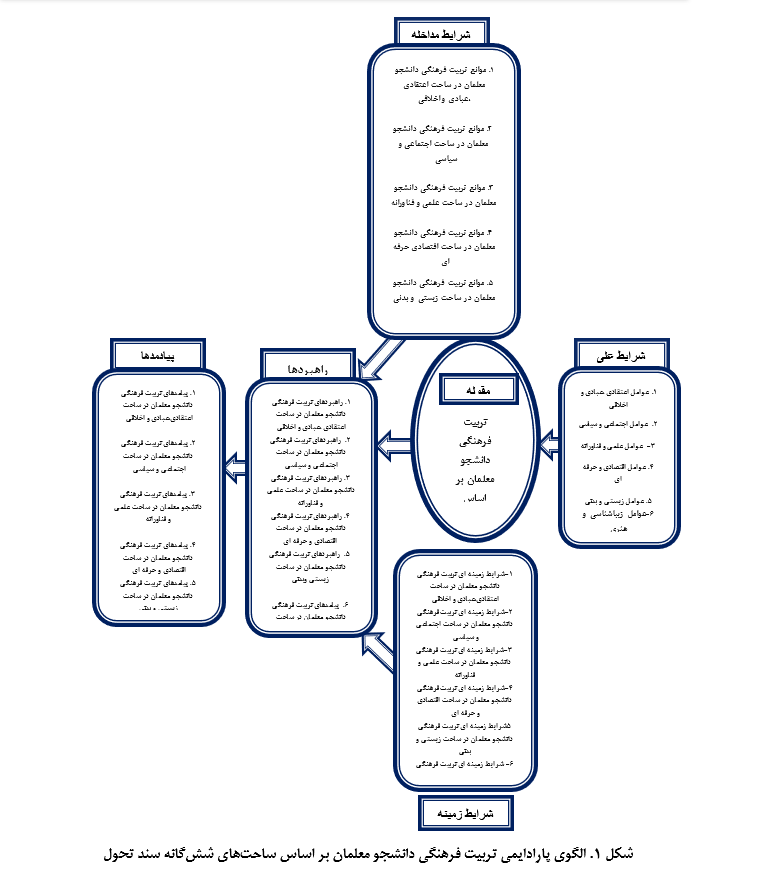Designing and Validating the Cultural Education Framework for Student Teachers Based on the Six Areas of the Transformation Document
Keywords:
Cultural Education, Teacher Students, Farhangian University, Six Dimensions of the Transformation DocumentAbstract
This study aimed to design and validate the cultural education framework for student teachers based on the six areas of the Transformation Document. The research was applied in purpose and utilized a sequential exploratory mixed-method design with both qualitative and quantitative components. In the qualitative phase, the dimensions of the proposed framework were extracted using grounded theory through interviews. In the quantitative phase, the validation of the paradigmatic model was examined in two steps: first, using the fuzzy Delphi method; and second, using the structural equation modeling (SEM) approach with partial least squares (PLS) methodology via the PLS-3 software. The qualitative research population included faculty members from the Farhangian University of Khorasan Razavi Province, and the quantitative population comprised all faculty members of Farhangian University in the same province. In the qualitative phase, purposive sampling was employed, and based on theoretical saturation, 12 participants were selected. In the quantitative phase, based on Cochran’s formula, 320 participants were selected using random sampling. The research tools included a semi-structured interview in the qualitative phase to explore the experiences, views, and knowledge of experts, and a researcher-developed questionnaire in the quantitative phase, designed based on criteria extracted from the qualitative phase, to collect data related to the cultural education framework for student teachers aligned with the six areas of the Transformation Document. The validity of the questionnaire in the qualitative phase was established through face and content validity, and its reliability was assessed using repeatability and stability indices (0.81). In the quantitative phase, face validity, content validity (0.74), and construct validity were confirmed, and reliability was determined through Cronbach’s alpha, ranging from 0.73 to 0.80 for the questionnaire components. The qualitative findings identified causal, contextual, intervening conditions, strategies, and consequences of the paradigmatic model for the cultural education of student teachers, based on the six areas of the Transformation Document. Fuzzy Delphi results indicated that all concepts related to the paradigmatic model of cultural education for student teachers had an acceptance threshold above 0.7, and the identified components for the paradigmatic model were confirmed. Finally, to assess the proposed research model, the structural equation modeling approach using the partial least squares method via PLS-3 software was employed. The results demonstrated the overall goodness-of-fit of the model, with both the structural and measurement models showing adequate quality in explaining the research variables. It can be concluded that enhancing cultural education in student teachers can be achieved through the promotion of religious education, economic education, scientific education, social education, physical education, and artistic education.
Downloads
References
Hu S, Xing G, Xin J. Impacting elements of metaverse platforms' intentional use in cultural education: Empirical data
drawn from UTAUT, TTF, and flow theory. Applied Sciences. 2024;14(21):9984. doi: 10.3390/app14219984.
Eden CA, Chisom ON, Adeniyi IS. Cultural competence in education: Strategies for fostering inclusivity and diversity
awareness. International Journal of Applied Research in Social Sciences. 2024;6(3):383-92. doi: 10.51594/ijarss.v6i3.895.
Yang R, Gao CY. Rethinking cultural competence education in the global era: Insights from Fei Xiaotong's theory of
cultural self-awareness. Frontiers of Education in China. 2020;15(4):539-63. doi: 10.1007/s11516-020-0026-4.
Gokturk JH, Whitington V, Shin AM. Teaching culture through culture: A case study of culturally responsive
pedagogies in an Australian early childhood/primary context. Journal of Research in Childhood Education. 2021;34(1):218-
doi: 10.1080/02568543.2019.1692110.
Khodabakhshi S, Safari Y, Nateghi F. Designing and Validating the Optimal Model of Cultural Education for Student
Teachers at Farhangian University. Educational and School Studies. 2024;12(4):539-64.
Hafezi A, Abedipour MS, Khosravi H, Fattahpour A, Sharifi S, editors. Cultural and Artistic Education of Students.
Fifth International Conference on Educational Sciences, Psychology, Counseling, and Education; 2025.
Abdollahnejad N, editor The Fundamental Education Reform Document and Its Challenges. Fourth National Scientific
and Research Conference on Psychology and Educational Sciences; 2019.
Rahespar Z, Salehi K, editors. Educational-Transformational Trends Influencing School Management: Fundamental
Education Reform Document of the Islamic Republic of Iran. Fifth International Conference on New Horizons in Humanities
and Management Sciences; 2020.
Alipour K, Ahmad Beigi F, Ansarian F, Izadi M. Identifying and Evaluating Spiritual Education Components Based
on the Fundamental Education Reform Document. Sociology of Education. 2025;10(2):419-29.
Shamshiri B. The Role and Position of Cultural Education in Teacher Training Systems. Teacher Education Policy
Studies. 2017;1(2):109-24.
Khonkdar Tarsi M, Salahshoori A. Cultural Education Factors from the Perspective of Imam Khomeini (RA).
Research in Islamic Education Issues. 2013;21(20):1-12.
Karimi Firoozjayi M, Sharifzadeh HA-S, Karamkhani Z. Identifying Cultural Education Components and Their
Relationship with Mass Media (Emphasizing Virtual Space). Educational Sciences. 2024;30(2):213-34.

Downloads
Published
Submitted
Revised
Accepted
Issue
Section
License
Copyright (c) 2025 Journal of Study and Innovation in Education and Development

This work is licensed under a Creative Commons Attribution-NonCommercial 4.0 International License.










